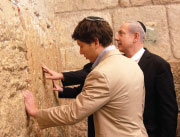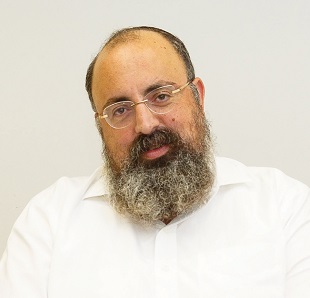
OPEN COMMUNICATION Bibi Netanyahu in conversation with Mishpacha’s Yossi Elituv and Aryeh Ehrlich. Prime Minister Binyamin Netanyahu may be facing down enemies from without and within but all that hasn’t stopped him from waving the banner of resistance when it comes to pressure and concessions. With a biography of Alexander Hamilton on his desk the prime minister says he’s inspired by this leader to whom America owes its existence “and who had a fierce admiration for the Jewish nation” (Photos: Flash90 Ezra Landau)
T wo large glass doors separate the outside world from the bubble in which the State of Israel is managed. Few are granted entry to the heavily guarded complex — known as the “aquarium” — and then only after forfeiting all telephones recording devices or any other electronic equipment.
Outside the political sabers are rattling while the media punctuates virtually every broadcast with solemn reports of investigations and scandals surrounding Prime Minister Netanyahu. Inside the aquarium though not a ripple disturbs the calm. In this bastion of security and confidence secretaries neatly tiptoe around the man who leads the government careful not to violate his few moments of tranquility amid long hours of tension.
The past year has been one of the stormiest of Prime Minister Binyamin Netanyahu’s political life. Two of his close confidants private attorneys Yitzchak Molcho (Bibi’s envoy for secret trips around the world including to Arab countries) and David Shimron (who manages his personal and public dealings and is also Bibi’s cousin) were also caught in the thunder and Ari Harrow his close former aide found himself under police investigation as well. Netanyahu is walking around with a virtual sword upon his neck while an entire investigative committee combs through his affairs from morning till night. Nearly 500 people have been interrogated in the case including journalists philanthropists bankers employees and even pizza deliverymen. But none of this fazes the prime minister who really seems to believe the slogan he coined: “They won’t find anything because there’s nothing to be found.”
The day in Netanyahu’s office begins at 8:30 with a staff briefing by chief of staff Yoav Horowitz. At nine the prime minister arrives and begins a packed day. Those close to Netnayahu say he always arrives at work alert and refreshed after a morning walk or swim — notwithstanding the fact that he often retires as late as three a.m. He utilizes the wee hours of the night to make calls to later time zones overseas.
The prime minister regularly holds brainstorming meetings with employees and advisors but ultimately say those in the inner circle Netanyahu makes the decisions himself. And he’s one of the few citizens of the cell phone capital of the world who doesn’t have one for fear of wiretaps and leaks. There is no active computer in his office either; instead he still works with paper and pen. His speechwriter is Chaggai Charif a kippah-wearer who is proficient in Jewish sources and sprinkles Netanyahu’s speeches with a generous helping of pesukim from Tanach (although Netanyahu is known to edit the speeches on his own).
It was inside this high-energy office that we sat with the prime minister enjoying our own memorable exclusive conversation for our upcoming book In the Moment of Truth (B’rega Ha’emet) which chronicles the communication that the Lubavitcher Rebbe had with the leaders of Israel over the years.

“My father was consumed with the matter of Divine Providence” says Bibi who credits Professor Benzion Netanyahu (home page) with instilling in him the belief in the historic right of the Jewish nation to all of Eretz Yisrael; with son Avner at the Kosel (above)
Netanyahu is one of the last remaining leaders in Israel who had a close connection to the Lubavitcher Rebbe. He was preceded by President Zalman Shazar and prime ministers Begin Shamir Rabin and Peres. They as well as many leaders of the security and defense establishments IDF generals and government ministers maintained ongoing contact with the Rebbe either in person by phone or by written correspondence.
Netanyahu who first met the Rebbe in a highly publicized encounter on Simchas Torah of 1984 soon after he became Israel’s ambassador to the United Nations settled into our meeting which seemed to take him back to other less complex times as he basked in the memories of those early political forays with the advice and wisdom of the Rebbe backing him all the way.
Founding Father
The prime minister had a few minutes of downtime before we arrived and — voracious reader that he is — always likes to use those precious interim time slots to peruse historical tomes. When we arrived he was stealing the remaining seconds to read a few more pages of a fat book titled simply Alexander Hamilton a biography of one of America’s founding fathers and a shaper of the nation’s financial and political system.
Netanyahu purchased the book last fall when he was in New York to address the UN after UNESCO’s notorious decision to disconnect the Jewish People from Har Habayis and the Kosel. During a few free hours he slipped out with his friend and confidant Israel’s ambassador to Washington Ron Dermer to a bookstore in Manhattan. As he was forging his way among the mass of local customers and curious tourists who sought to get close Netanyahu collected a few books from the American history genre that he favors. One of those purchases was historian Ron Chernow’s 2004 biography about the colorful founding father who died while still in his 40s; the work was prompted by the discovery of some manuscripts written in Hamilton’s own hand over 200 years ago.
Netanyahu devours biographies of prominent leaders especially those who serve as an inspiration. (Excerpted from Mishpacha Issue 657)


